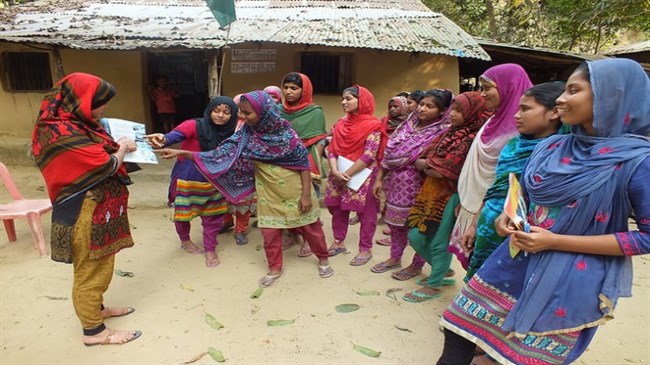
Her parents had settled on someone they considered a reasonably wealthy young man with a good family background, and did not want to miss the opportunity to wed their eldest daughter.
Farzana’s father, Mohammad Yusuf Ali, told IPS, “I thought it was a blessing when the proposal came to me from a family friend who said that the talented groom-to-be has his own business and ready home in the heart of a busy district town in Barisal, not far from where we live.”
No one defies Yusuf, an influential man in Char Nurul Amin Village in Bhola, an island district in coastal Bangladesh, where most people depend on agriculture and fishing to make a living.
So, without consulting his daughter, Yusuf promised her as a bride and asked the family to prepare for the wedding.
Farzana was only 14 years old and did not want to get married, but she didn’t know where to turn. Then Selina Aktar, who lives nearby, offered to help.
Aktar said, “It was not surprising, but I was [still] shocked at how parents readily accept such marriage proposals without considering the age of their daughters.”
On the eve of the wedding, Aktar arranged a meeting with Farzana’s parents and asked them to call it off and let her stay in high school until she graduated.
Aktar is the facilitator of a seven-member Community Legal Services (CLS) Organization that advises students, parents and others on legal rights, including rights of adolescents.
“After several hours of discussions, we were able to convince Farzana’s parents that an educated girl was more precious than a girl thought to be a burden for her family at her early age,” Aktar said.
Abul Kaiser, a legal aid adviser with COAST, a leading NGO operating in the coastal regions of Bangladesh for more than three decades now, and whose work focuses mostly on social inequalities, said, “The society is cursed with myths and most parents still biased on such medieval beliefs favor early marriage. A girl soon after her puberty is considered a burden to the family and parents look for opportunities to get rid her as soon as possible for so-called ‘protection’ of their daughters.”
To challenge the traditional beliefs that still haunt many communities in this modern age, COAST promotes informal learning through various programs which they believe make a positive impact.
Executive Director Rezaul Karim Chowdhury said, “The society needs to be empowered with information on the rights of such adolescent girls, and that is what we are facilitating. Most parents who may not have had opportunities of going to schools are expected to behave this way but our approach is to change this mindset so that a sense of acceptance exists.”
Radio Meghna, a community radio with limited broadcast frequency operating since February 2015 in south Bhola’s Char Fassion, has been at the forefront of such advocacy programs.
The station broadcasts targeted programs focused on dispelling myths through informal learning programs.
Fatema Aktar Champa, a producer at the radio station, said, “We have a large audience and so we take the opportunity to educate adolescents and also their parents on merits and demerits of early marriage. On various occasions we invite experts almost every day to talk about reproductive health, adolescents’ legal rights, need for education and the values, social injustices and many more allied issues linked to challenges of adolescents.”
Unlike other community radio stations, Radio Meghna is completely run by a team of about 20 adolescent girls.
Khadiza Banu, one of the producers said, “There is a general feeling that the radio team at Meghna has a wide range of acceptance in the society. On many occasions we broadcast programs just to build trust on parents’ decisions to prevent early marriage and allow continuing education.”
Education is key to development, and girl’s education is especially important since it is undermined by patriarchal cultural norms.
In Cox’s Bazar district, COAST has taken a different approach to empowering adolescent girls to demand their rights and offering livelihood opportunities.
Despite traditional beliefs that devalue girls’ education, especially in poor, rural areas, adolescent girls in many regions of Bangladesh are getting help from a programe called Shonglap – dialogue that calls for capacity building and developing occupational skills for marginalized groups in society.

Add new comment